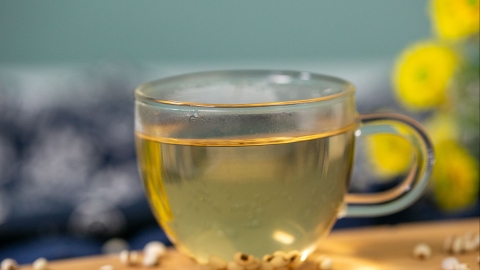What kind of tea can help remove dampness from the body?
Under normal circumstances, drinking moderate amounts of Poria tea, red bean and coix seed tea, tangerine peel tea, agastache tea, or ginger-date tea may assist in eliminating dampness. These herbal teas help regulate the body's condition through strengthening the spleen, promoting diuresis, and warming to resolve dampness, but they are only suitable as daily supportive measures. If excessive dampness causes persistent symptoms such as abdominal bloating, fatigue, or thick, greasy tongue coating, medical advice should be sought promptly.
1. Poria Tea: Poria is neutral in nature and sweet in taste, capable of strengthening the spleen, removing dampness, calming the mind, and improving sleep. Boiled as a tea, it promotes water metabolism and helps relieve edema and fatigue caused by spleen deficiency with excess dampness. It is suitable for most people for regular consumption and does not cause obvious cooling or irritation.
2. Red Bean and Coix Seed Tea: Red beans (adzuki beans) help promote urination and reduce swelling, while coix seed strengthens the spleen and removes dampness. When brewed together, this tea is ideal for individuals with damp-heat constitution, helping alleviate oily skin and sticky bowel movements. Note that coix seed should be stir-fried first to reduce its cold nature.

3. Tangerine Peel Tea: Dried tangerine peel is warm in nature and pungent in taste, effective in regulating qi, strengthening the spleen, drying dampness, and resolving phlegm. Drinking this tea can improve bloating and poor appetite caused by cold-dampness, and also relieve coughing with excessive phlegm due to damp-phlegm. It is particularly suitable for those with spleen-stomach deficiency-cold accompanied by heavy dampness.
4. Agastache Tea: Agastache is slightly warm and pungent, known for its ability to resolve dampness, relieve exterior patterns, harmonize the stomach, and stop vomiting. Brewed as a tea, it helps relieve nausea, diarrhea, and dizziness caused by summer damp-heat, and provides supportive regulation for gastrointestinal discomfort due to dampness obstructing the middle jiao.
5. Ginger-Date Tea: Ginger warms the body and disperses cold-dampness, while dates strengthen the spleen and boost qi. This tea is ideal for individuals with cold-damp constitution, helping improve cold hands and feet, sensitivity to cold, and excessive dampness. Those with a heat-prone constitution should reduce the amount of ginger used.
When consuming dampness-resolving teas, individuals should choose according to their own body constitution and avoid long-term or excessive intake. Use appropriate amounts when brewing—for example, 5–10 grams of coix seed per serving. During consumption, maintain a light diet and minimize intake of greasy and raw-cold foods to enhance the effectiveness of dampness removal.




